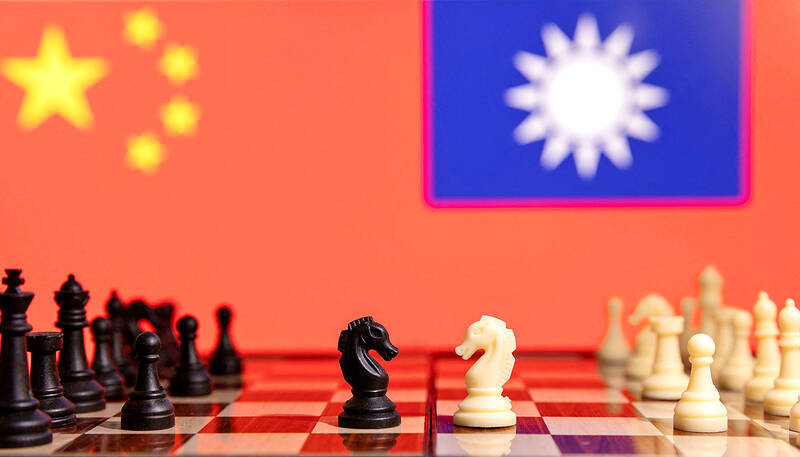China is likely to attempt to put pressure on Taiwan’s incoming president after the nation goes to the polls today, including staging military maneuvers near the country this spring, two senior government officials said.
No matter which candidate wins the presidential election, Beijing’s military and economic pressure on Taiwan’s next president is likely to increase, officials speaking on condition of anonymity said.
Taiwan goes to the polls today to elect a new president and legislature under the shadow of an increasingly assertive China which has called the vote a choice between “war and peace.”

Photo: Reuters
Beijing is likely to apply “great pressure” in a bid to influence the new president’s inaugural address on May 20, which is expected to set the tone for the new administration’s China policy, said one official, who has knowledge of Taiwan’s security planning.
China’s top Taiwan policy agency, the Taiwan Affairs Office, did not immediately respond to a request for comment.
While large-scale military drills near Taiwan are unlikely immediately after the vote, Beijing is likely to stage maneuvers near the nation after March due to more favorable weather and sea conditions, the official said, citing Taiwan’s security assessment.
The potential for increasing tensions over Taiwan, especially after China staged two rounds of major war games near the nation in April of last year and August of 2022, is being closely watched in the region and by Washington and its allies.
Two Western security officials, speaking on condition of anonymity as they were not authorized to speak to the media, said China was likely to respond militarily at some point after the election, although they did not believe it would be on the scale of the last two war games.
The Taiwanese official said Beijing could also opt to limit any show of military force in the coming months because of considerations including improving US-China relations.
The US-China relationship tumbled to historic lows last year, but since US President Joe Biden and Chinese President Xi Jinping’s (習近平) meeting in November last year and an agreement to re-establish military-to-military ties, senior Chinese and US officials have staged meetings.
Should a party that wins the presidency fail to gain a legislative majority, China is likely to label the new administration a “minority government,” the Taiwanese official said.
In what Taiwan views as a bid to weaken a new administration, China is also likely to invite pro-Beijing Taiwanese politicians to visit China and continue what Taipei perceives as disinformation campaigns against the government, the official said.
Taiwan’s Ministry of National Defense yesterday said that it had detected five Chinese balloons flying over the Taiwan Strait over the past 24 hours, one of which crossed Taiwan proper, the latest in a spate of such balloons the ministry says it has spotted over the past month.
Taiwan has described a range of actions by China, including the balloon flights, reports by China’s state-media and threats of further trade sanctions as a form of psychological warfare against Taiwanese ahead of the vote.
“China’s voting interference in Taiwan is a textbook example,” the first Taiwanese official said. “Other countries must come and learn quickly.”
Election interference allegations are the Democratic Progressive Party’s “dirty trick” to win votes, Beijing said.

Taipei and New Taipei City government officials are aiming to have the first phase of the Wanhua-Jungho-Shulin Mass Rapid Transit (MRT) line completed and opened by 2027, following the arrival of the first train set yesterday. The 22km-long Light Green Line would connect four densely populated districts in Taipei and New Taipei City: Wanhua (萬華), Jhonghe (中和), Tucheng (土城) and Shulin (樹林). The first phase of the project would connect Wanhua and Jhonghe districts, with Chiang Kai-shek Memorial Hall and Chukuang (莒光) being the terminal stations. The two municipalities jointly hosted a ceremony for the first train to be used

MILITARY AID: Taiwan has received a first batch of US long-range tactical missiles ahead of schedule, with a second shipment expected to be delivered by 2026 The US’ early delivery of long-range tactical ballistic missiles to Taiwan last month carries political and strategic significance, a military source said yesterday. According to the Ministry of National Defense’s budget report, the batch of military hardware from the US, including 11 sets of M142 High Mobility Artillery Rocket Systems (HIMARS) and 64 MGM-140 Army Tactical Missile Systems, had been scheduled to be delivered to Taiwan between the end of this year and the beginning of next year. However, the first batch arrived last month, earlier than scheduled, with the second batch —18 sets of HIMARS, 20 MGM-140 missiles and 864 M30

Representative to the US Alexander Yui delivered a letter from the government to US president-elect Donald Trump during a meeting with a former Trump administration official, CNN reported yesterday. Yui on Thursday met with former US national security adviser Robert O’Brien over a private lunch in Salt Lake City, Utah, with US Representative Chris Stewart, the Web site of the US cable news channel reported, citing three sources familiar with the matter. “During that lunch the letter was passed along, and then shared with Trump, two of the sources said,” CNN said. O’Brien declined to comment on the lunch, as did the Taipei

A woman who allegedly attacked a high-school student with a utility knife, injuring his face, on a Taipei metro train late on Friday has been transferred to prosecutors, police said yesterday. The incident occurred near MRT Xinpu Station at about 10:17pm on a Bannan Line train headed toward Dingpu, New Taipei City police said. Before police arrived at the station to arrest the suspect, a woman surnamed Wang (王) who is in her early 40s, she had already been subdued by four male passengers, one of whom was an off-duty Taipei police officer, police said. The student, 17, who sustained a cut about